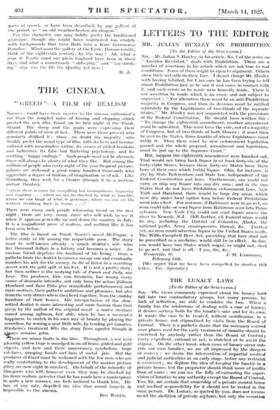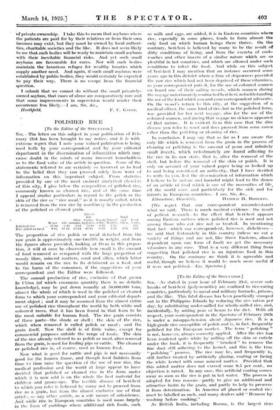THE LUNACY LAWS
[To the Editor of the SPECTATOR". .
Sin, —The views commonly expressed about the lunacy laws fall into two -contradictory groups, but many persons, by lack of reflection, are able to combine the two: When a family has the misfortune of dealing with a case of -lunacy, it desires secrecy both for the lunatic's sake and for its own. It wants the ease to be treated, without -certification, in a private house; not stigmatized by visits from the Board of Control. There is a pathetic desire that the necessary control over places used for the early treatment of insanity should be exercised by anybody rather than the Board of Control ; every expedient, rational or not, is clutched at to avoid the stigma. On the other hand,- when eases of lunacy occur out- side our own families, we are all impressed by the dangers of secrecy ; we desire the intervention of impartial medical and judicial authorities at an early stage, before any restraint is exercised ; we deplore the idea of keeping the lunatic in a private house, lest the proprietor should think more of profits than of cures ; we can see the folly of entrusting the super- vision of lunatics to any authority except the Board of Control. You, Sir, are certain that ownership of a private mental home and medical responsibility for it should not be vested in the same person. Dr. Lomax, as quoted by you, does not recom- mend the abolition of private asylums, but only the cessation of private ownership. I take this to mean that asylums where the patients are paid for-by their relatives or from their own incomes may exist, but they must be owned by local authori- ties, charitable societies and the like. It does not seem likely to me that such bodies will be ready to maintain small asylums with their inevitable financial risks. And yet such small Asylums are favourable for cures. Nor will such bodies maintain the hixurious refuges for wealthy lunatics which supply another need. And again, if such small asylums were established by public bodies, they would certainly be expected to pay their way. There is no escape from the financial nuestion.
I submit that we cannot do without the small privately- owned asylum, that cases of abuse are comparatively rare and that some improvements in supervision would render their occurrence less likely.---I am, Sir, &c.,















































 Previous page
Previous page